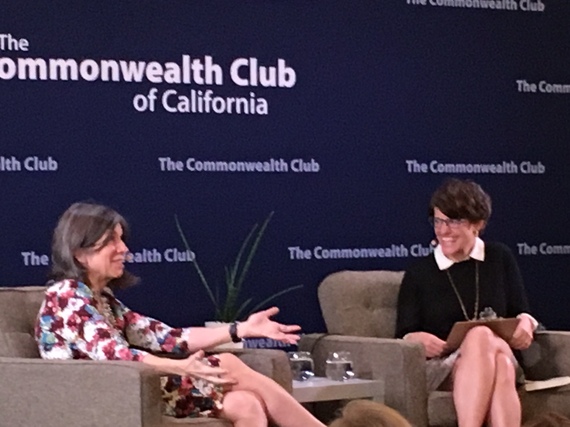Anna Quindlen, on tour with her new novel Miller's Valley, sat down for a rollicking interview with author Kelly Corrigan recently at San Francisco's Commonwealth Club. Within an hour they had traded profound thoughts and raucous asides - some printable and some not - on topics ranging from literary form to family histories to feminism, from death & dying to the prosecution of rapists.
A few random excerpts:
Re Miller's Valley - which reviewers have described as "a quintessential small town story about a family you will never forget" - Quindlen said she felt early on that she wanted it to be written in the first person (Mimi, who grows from an 11-year-old into her sixties in the book, is the narrator) because she wanted to leave "some ambiguity at the end, and that's only possible with a first person narrator. There is a kind of intimacy you can only develop through the first person."
On how much of Miller's Valley - and her seven earlier novels - is taken from her own life: "When I was a newspaper reporter people thought I made things up. Now I make things up and people think they're real."
On families, literary and otherwise: Corrigan, noting Quindlen's untroubled childhood and long-lasting, happy marriage, asked if "people who have not lived through deep dysfunction" can still produce great writing. "I had a happy childhood,"Quindlen responded, "but I remember always feeling that there was no place for me in the world." Then she listed three things that have made her the (highly acclaimed) writer she is: her mother's illness and death - Quindlen, the eldest of five siblings, left college in her sophomore year to care for her cancer-stricken mother - the "good luck to be a street reporter in New York City," and being a mom to her three now-grown children.
Corrigan followed with a family tale of her own. After calling her mother to tell her about an award just received, Corrigan was dismayed by her mother's being "not very impressed." So after a few moments of disappointment she called back to find out why. Her mother said, "I'm glad you called back. I'm jealous." To which Quindlen added, "We all said, 'I don't want the kind of life my mother had.'"
On memoir (both authors have produced well-received memoirs) v fiction: "In memoirs there is stuff you can't talk about," Corrigan commented, "like jealousies, or sex with your husband. But in fiction we can be more honest about what hangs us up."
"How's feminism going?" Corrigan asked toward the end of the conversation. "We (feminists) are, like God, everywhere," Quindlen replied. Concerning one major issue of the feminist movement, Corrigan mentioned data that "reported rapes are up." Possibly, she added, because for so long rapes went unreported." But Quindlen noted ruefully that "fairly recently, in New York, you couldn't prosecute without a third party witness. "Someone had to walk in during the event, preferably a nun or a policeman."
Asked to name her favorite rising feminist, Quiundlen paused only briefly before saying "Lena Dunham. She immediately used her fame to help others. Every book event she does is tied to the local Planned Parenthood." Citing the oft-repeated feminist mantra Learn, Earn, Return, Quindlen said Dunham "is doing all three at the same time." And Quindlen couldn't resist getting in a plug for another woman she admires, "Hillary Rodham, as I like to call her, not using her slave name - is best qualified, and will make a great President."

